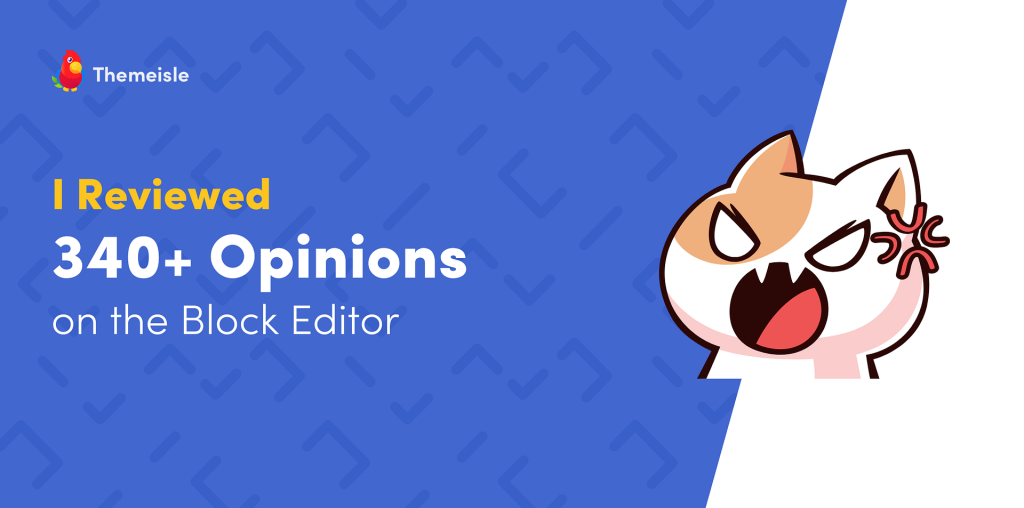Creating an analysis of user opinions on WordPress’ block editor – aka. Gutenberg – has been a fascinating journey. I explored over 340 opinions gathered from a range of platforms, including Reddit, Twitter, YouTube, and WordPress.org. In addition to these sources, I also reached out to developers of popular plugins and themes, as well as colleagues within our internal team and professionals in the WordPress community, such as writers and business owners.
- 📥 By the way, if you want to dig into all this yourself, you can see all the opinions I gathered in this Google Sheet. Note: This doesn’t include any opinions I received privately and didn’t get permission to make public.
I found gems like these: 🔴
Versus other ones like these: 🟢
The purpose of all this research was to understand the various sentiments surrounding the block editor. I wanted to uncover any recurring themes that illustrate the most common user experiences and attitudes as of 2024.
That “as of 2024” part is important here. We all know that Gutenberg wasn’t much to write home about at the time it was first released, which was during WordCamp Europe 2017. The editor got nearly only negative reviews back then, and the stigma mostly stuck for the better part of its lifespan.
However, the turns seem to be tabling, and we’ve been seeing more and more positive opinions out there. Take a look at the following chart, which compares 1-star and 5-star reviews of the Gutenberg plugin from 2019 to the present (earlier reviews are not readily available on WordPress.org):
We’ve nearly reached a tipping point, but as you can see, the percentage of negative reviews has started to rise again. That said, Gutenberg received significantly more reviews in its early stages than it does now.
To be exact, 1,024 reviews were submitted in 2019, but only 111 in 2023. This year, we’re likely to see even fewer, with the count at just 37 so far (eight months into the year at the time of writing).
So, is the block editor actually heading in the right direction? Has it been improving, only to decline again? Do users generally like or dislike Gutenberg? These are some tough questions, but I’ll try to shed some light on them here. Let’s explore what users really think of the block editor in 2024 and how these perspectives are shaping the ongoing conversation about its place in the WordPress ecosystem.
My research methodology
This was done in two stages. The first stage was what I mentioned in the intro – hunting for opinions across various platforms and communities, and also reaching out to people working with the block editor asking about their point of view. One guideline I set for myself was to gather opinions only from 2022 onward. The reason is simple: I wanted to avoid letting Gutenberg’s early struggles overshadow how good (or bad) it has been in more recent times.
Once I had all this feedback, stage two was to (1) sort it into positive, negative, and mixed categories. This helped me see the overall sentiment. From there, (2) I grouped similar opinions into clusters to identify themes that reflected common arguments and ideas.


I’ve identified about ten of those. The result you see in this post is a summary of the most significant trends and insights with some commentary from me.
And, in case you’re wondering what’s the basic breakdown of the numbers of positive 👍, negative 👎 and mixed 🤷♂️ opinions, it’s quite near a 50/50 split. To be exact: 159 positive, 139 negative, and 50 mixed.
This somewhat reflects the current sentiment and ratio of good to bad reviews for the Gutenberg plugin. That said, it’s not all black and white. There’s a lot of nuance in the individual opinions, with several interesting themes repeatedly emerging.
Hall of fame: my favorite opinions
Before I show you all the clusters and themes, let’s take a moment to highlight some of the opinions that stood out to me the most:
💡 This is a lightbox gallery. Click on the first image and then browse through the subsequent ones.
🟢 Positive
🔴 Negative
🟡 Mixed
Common themes and opinions
It’s very apparent that the sentiment is really all over the place. There are users who totally swear by it, users that totally swear at it, and everything in between.
Here’s a concise summary on the most common themes, arguments, and ideas according to real users:
🟢 “Gutenberg keeps improving and has a lot of potential”
Many users feel hopeful about the future of Gutenberg, seeing it improve with every update and turning into a must-have tool for modern website building for some of the users. Lots also agree that the block editor is the future of WordPress.
Key points:
- Users notice regular updates that improve features and usability.
- Gutenberg offers a modern approach to website building already.
- Despite initial skepticism, many users acknowledge the editor’s potential to improve workflows and site performance.
- Gutenberg is the future.
Example opinions:
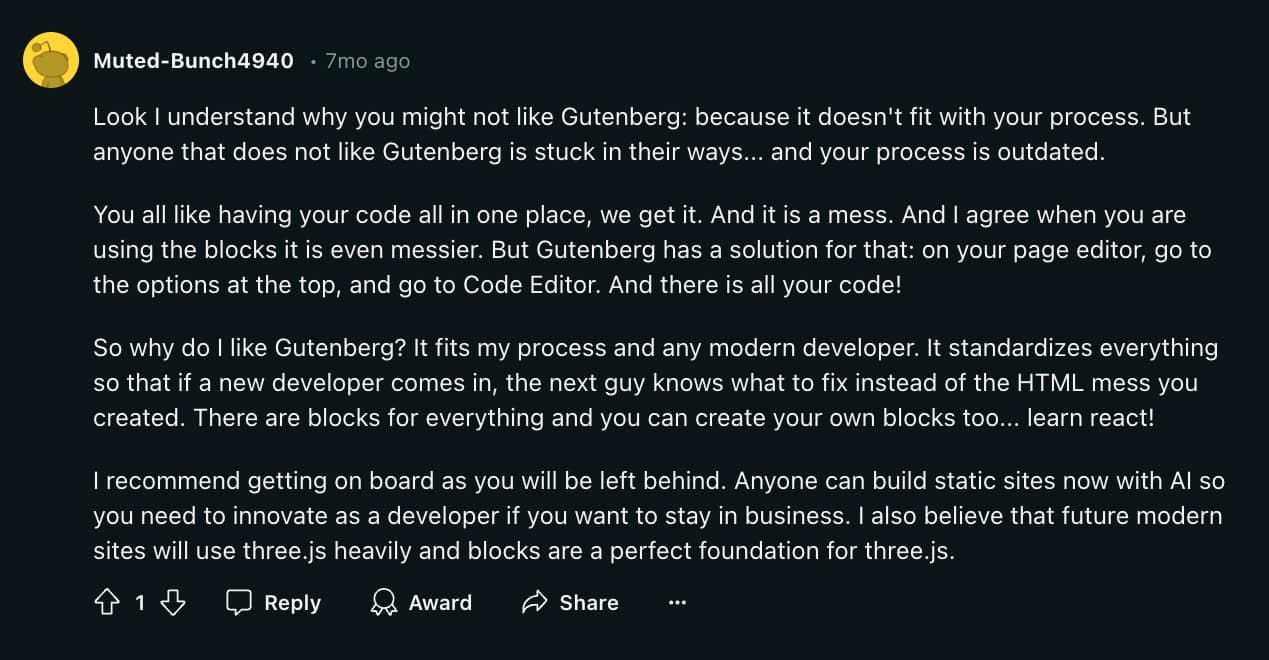

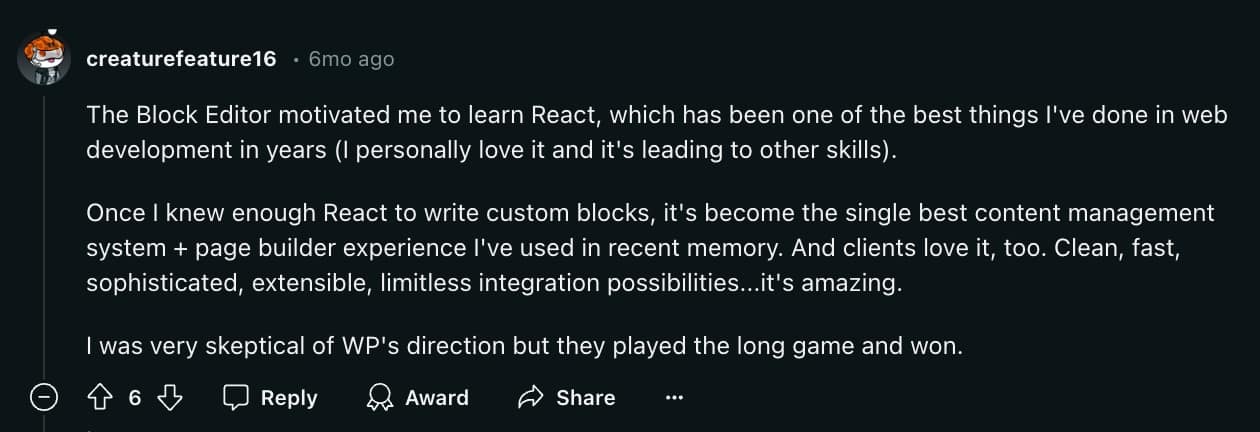















🟢 “Gutenberg is easy to use and flexible”
For those who’ve taken the time to learn it, Gutenberg is praised for its ease of use and flexibility. Newcomers to WordPress can especially enjoy how it lets them build and customize websites quickly without much hassle and while now requiring coding knowledge.
(Spoiler alert: you will find the exact opposite opinion in literally a second)
Key points:
- Users appreciate the straightforwardness of the editor, making it accessible to beginners.
- The block-based approach allows for easy manipulation and customization of page elements.
- Gutenberg supports efficient workflows, enabling users to build sites quickly once they become familiar with the system.
Example opinions:


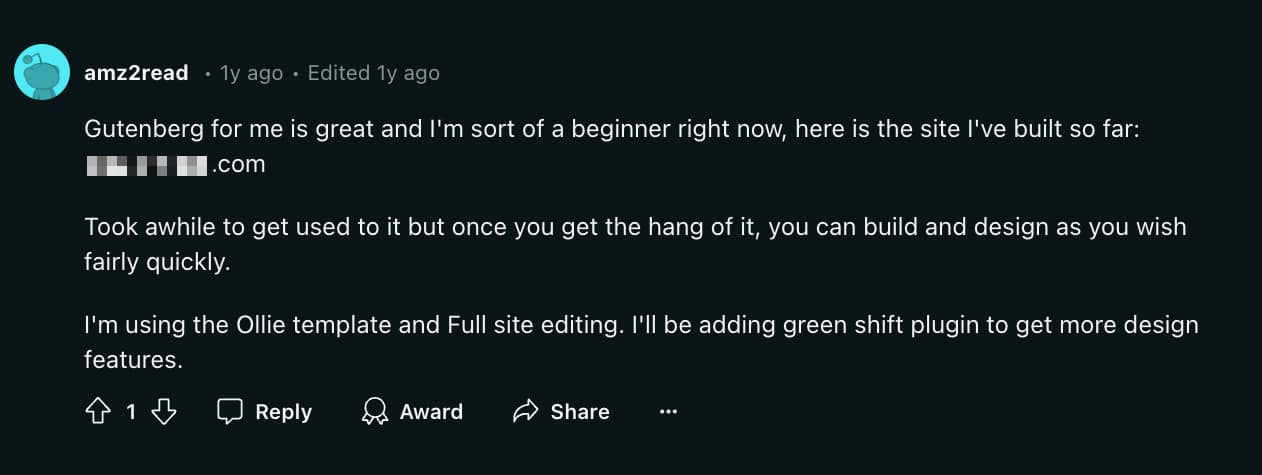





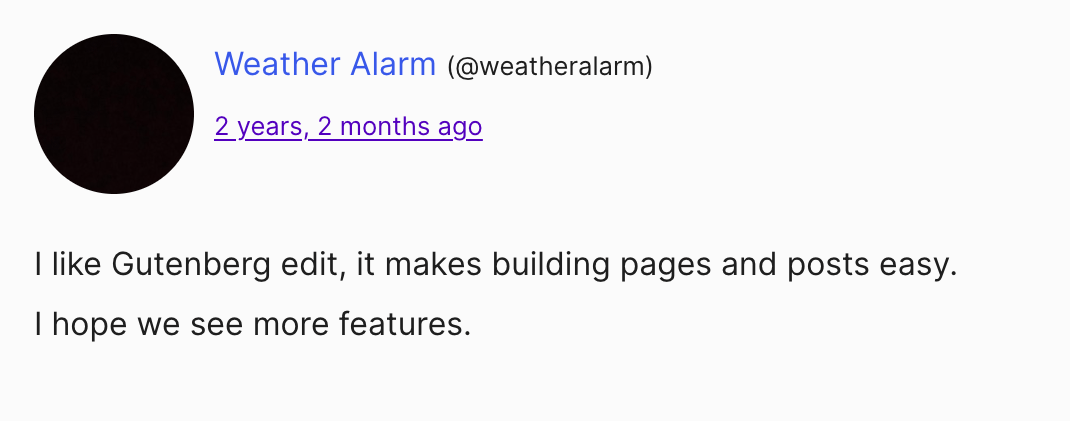



🔴 “Not at all! It’s actually too complex and difficult to learn!”
Some users struggle with Gutenberg’s learning curve. Those used to the classic editor or simpler tools find it complex and initially challenging to navigate. This is something mentioned very often among the opinions I’ve gathered. In particular, developers refer to their clients’ difficulties with the block editor. There’s also noticeable focus on how Gutenberg can be specifically difficult for users who are coming in with some classic editor experience and now need to transition to the block editor.
Key points:
- Many users find it challenging to adapt to the new block-based interface when coming from classic.
- Some tasks that were simpler in the classic editor are perceived as more complex in Gutenberg.
- Users feel they need to invest significant time to become proficient with the editor.
- Users find the editor less accessible than they expected, particularly for those used to simpler tools.
- Those managing sites for clients note backlash due to complexity.
Example opinions:
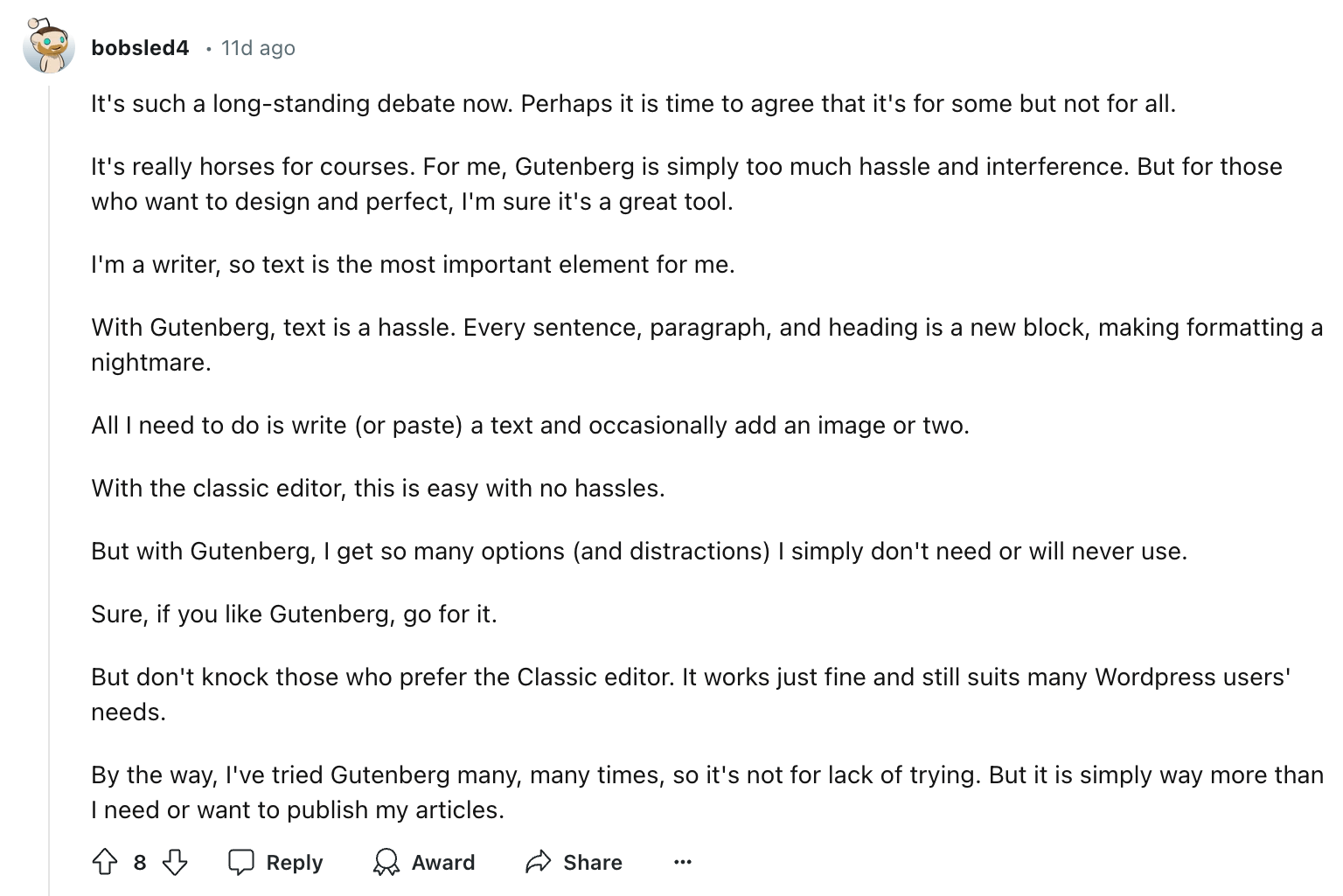

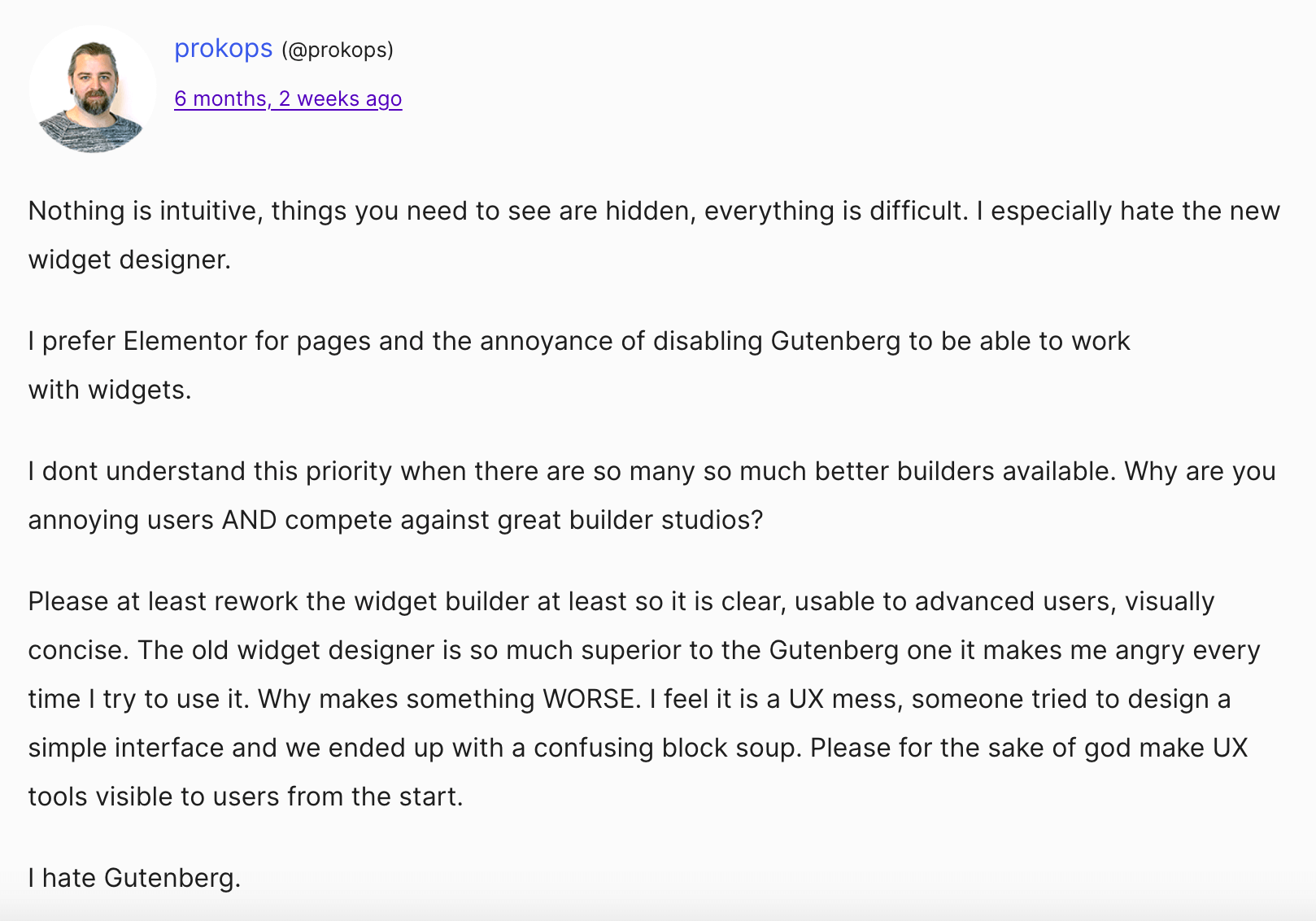





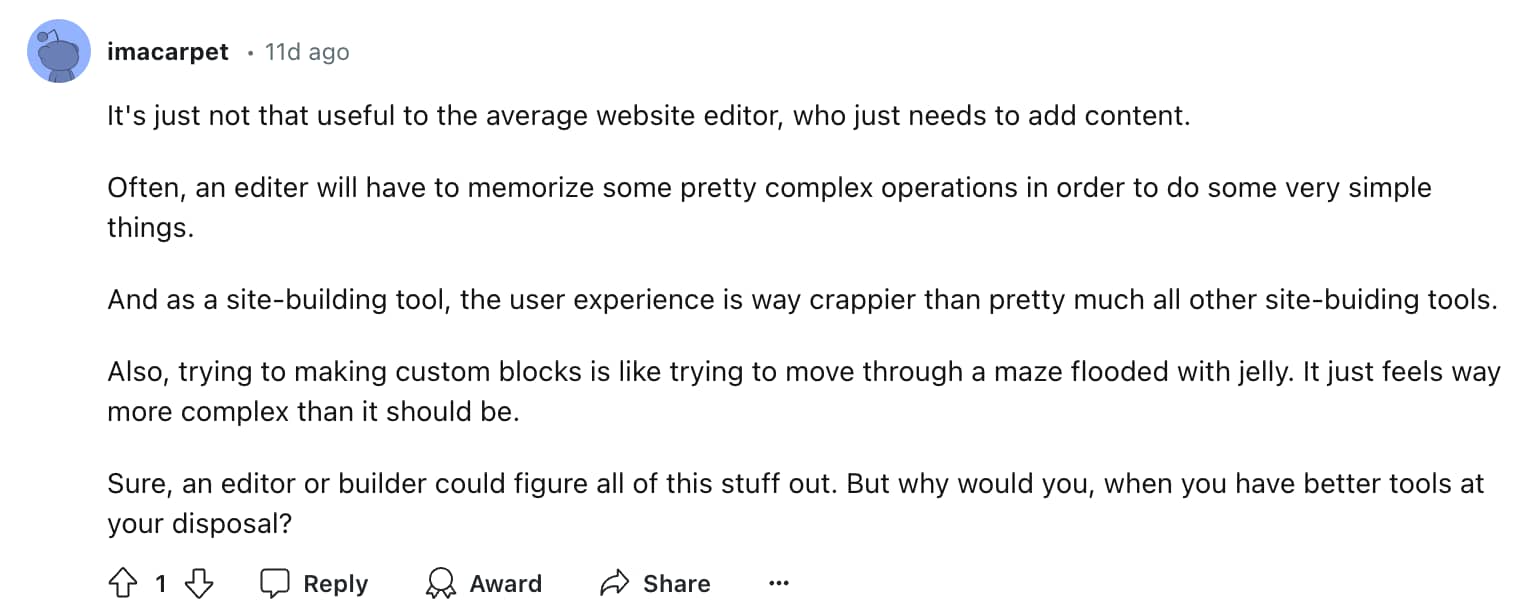





🟢 “Gutenberg is better than other page builders”
Users frequently compare Gutenberg to other popular page builders like Elementor. While you will find split opinions on this overall, there are a lot of voices on the positive side of the argument. Users who prefer Gutenberg often point to its performance, ease of use, and feature set.
Key points:
- Some users find Gutenberg faster and more reliable than competitors.
- Discussions often focus on the availability and flexibility of blocks compared to widgets or modules in other builders.
- Most of these opinions are very subjective and point to specific aspects that one person enjoys.
Example opinions:






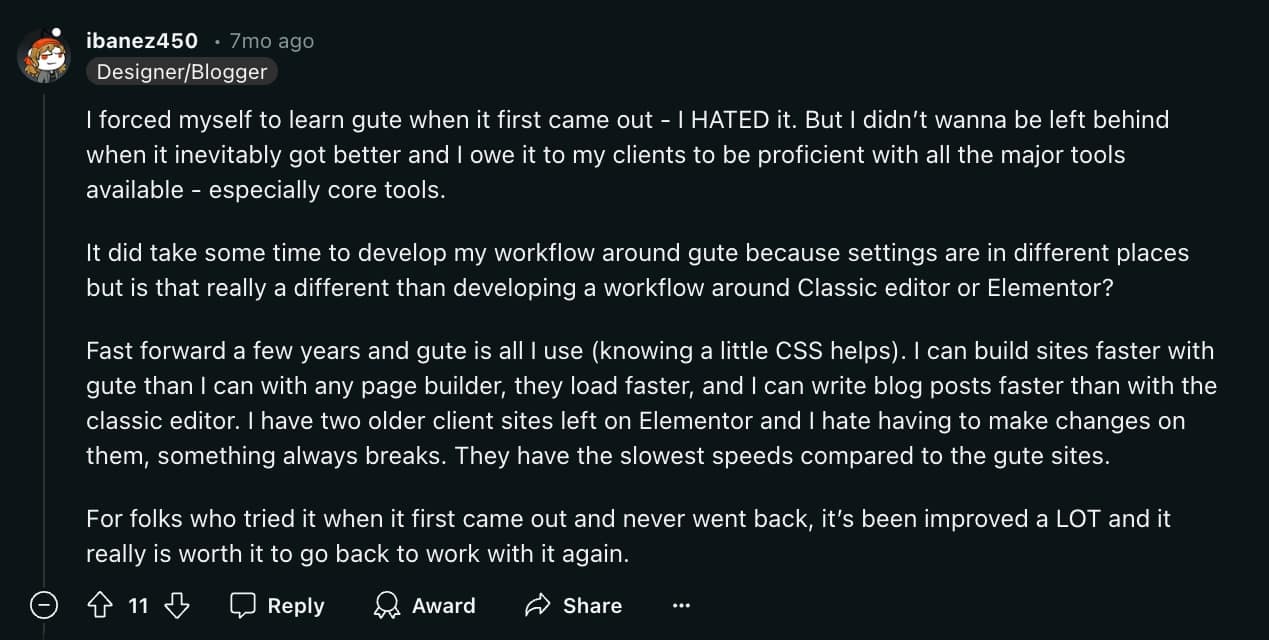







🟢 “Gutenberg offers a modern site building experience”
Users generally agree that Gutenberg offers a more modern and enhanced experience compared to the old classic editor. They like the updated design and feel it helps them achieve more with their websites, keeping everything fresh and up-to-date.
Key points:
- Users find Gutenberg offers a superior experience compared to the older WordPress editor.
- The interface is praised for being more modern, cleaner, and being better aligned with the needs of modern site building.
- Users appreciate the advanced features that allow for more dynamic and interactive page elements.
Example opinions:
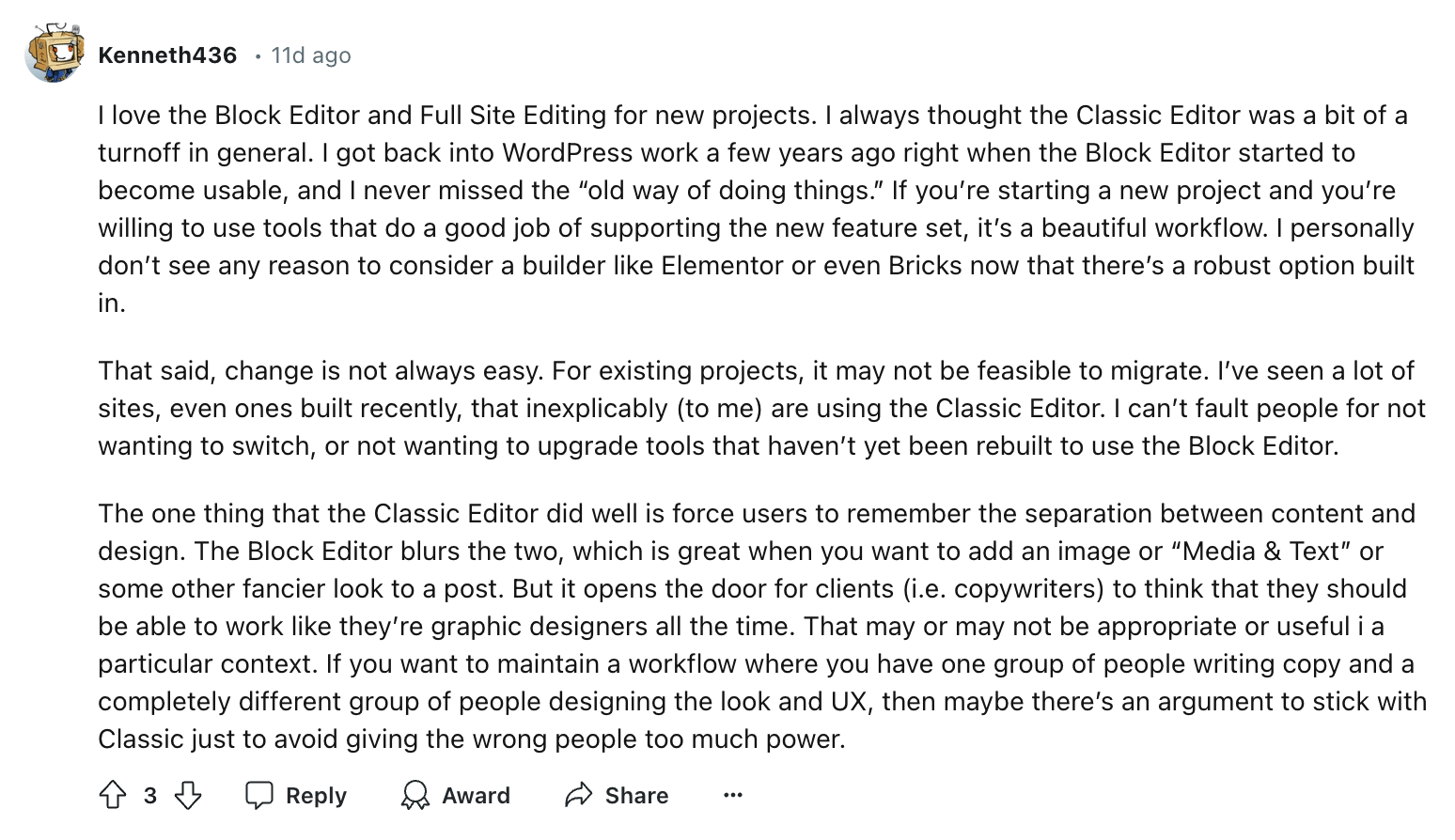

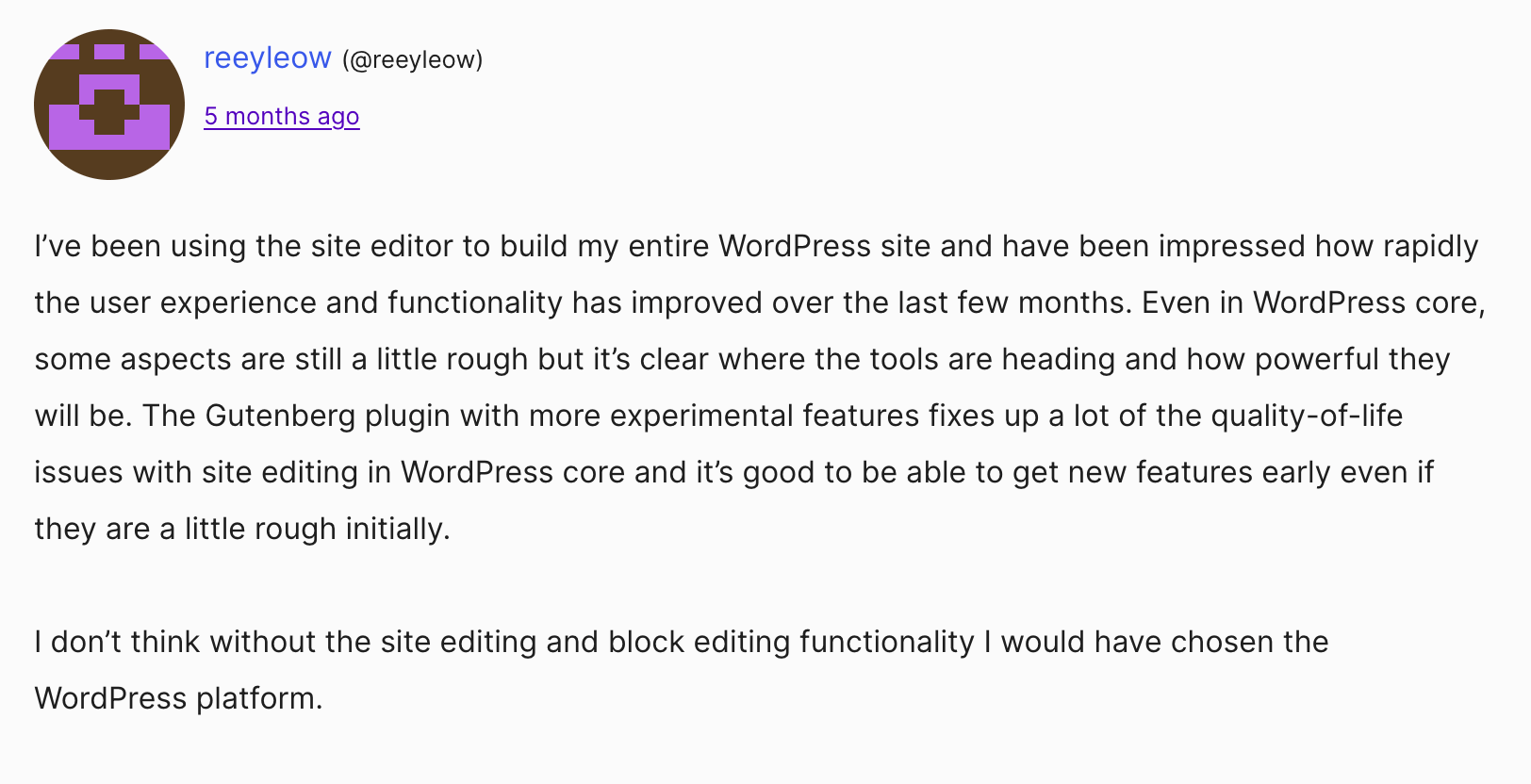







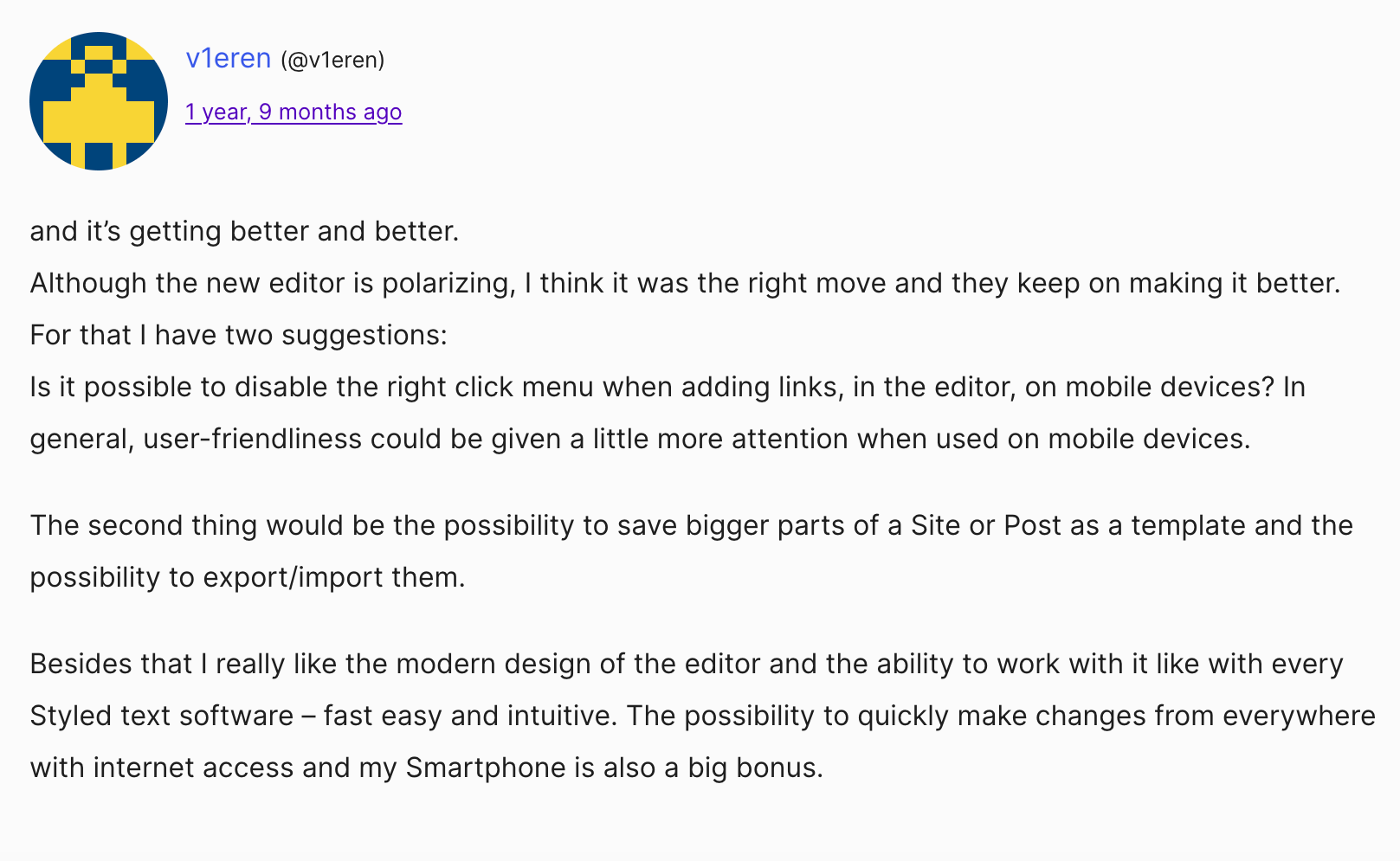

🔴 “Gutenberg is terrible for usability and has lots of interface issues”
On the other side of the spectrum, most of the criticism often centers on the interface, which some find confusing and not user-friendly at all. Users express frustration over design choices that don’t always align with their needs. Some also feel that Gutenberg tries to do too much, leading to unnecessary complexity. This overcomplication can slow users down and make straightforward tasks more difficult than they should be.
Key points:
- Complaints about the interface being hard to navigate and understand.
- Specific criticisms about layout choices that hinder efficiency.
- Even basic tasks can become cumbersome due to the editor’s interface choices.
- Users struggle with advanced features that are not as straightforward as expected.
Example opinions:
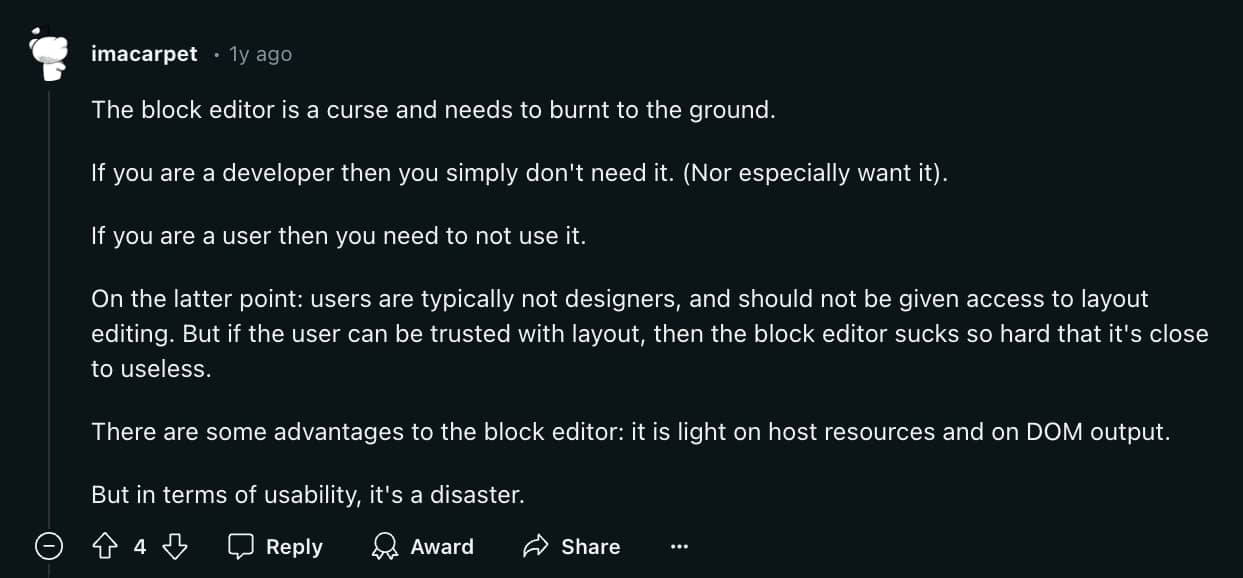

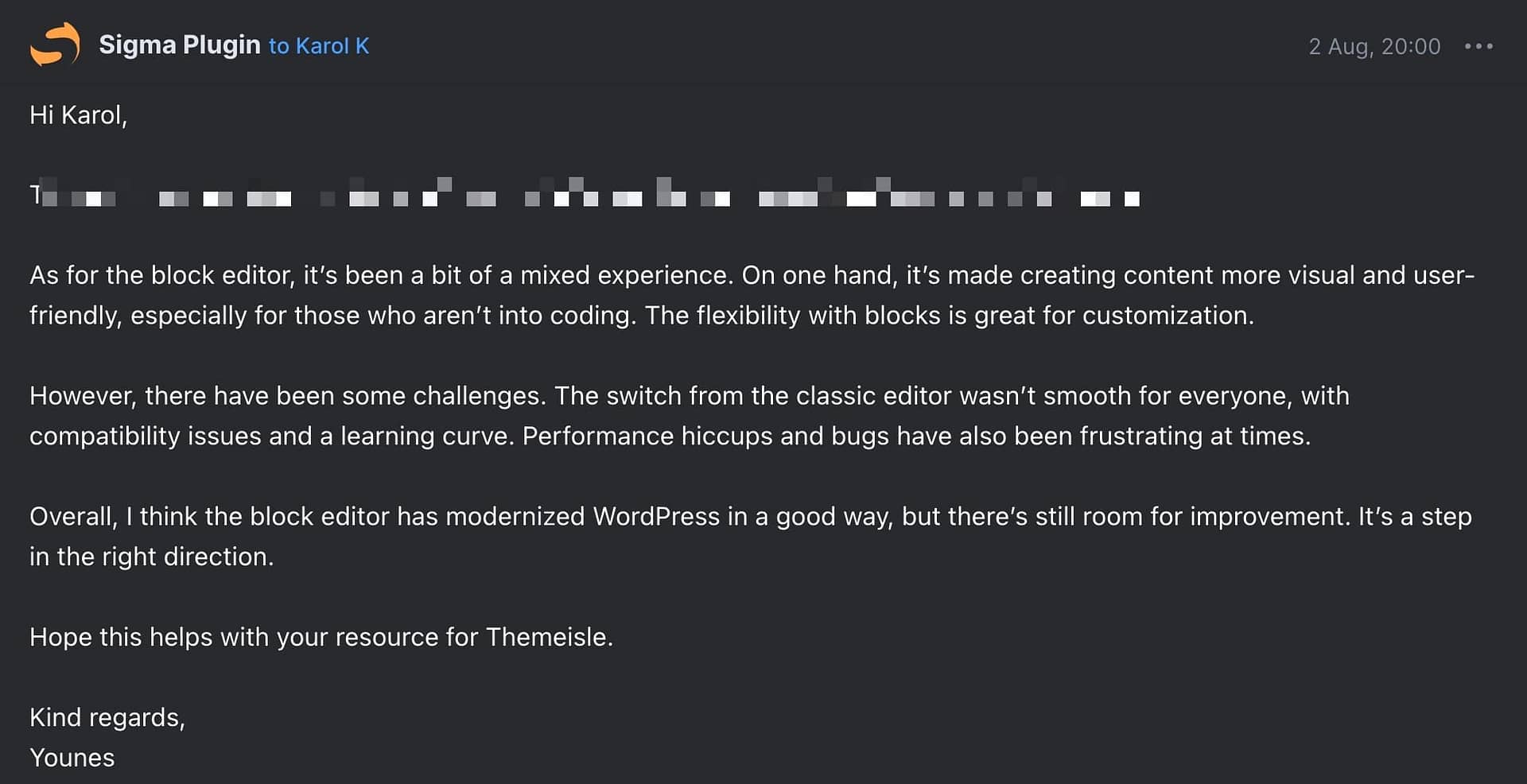

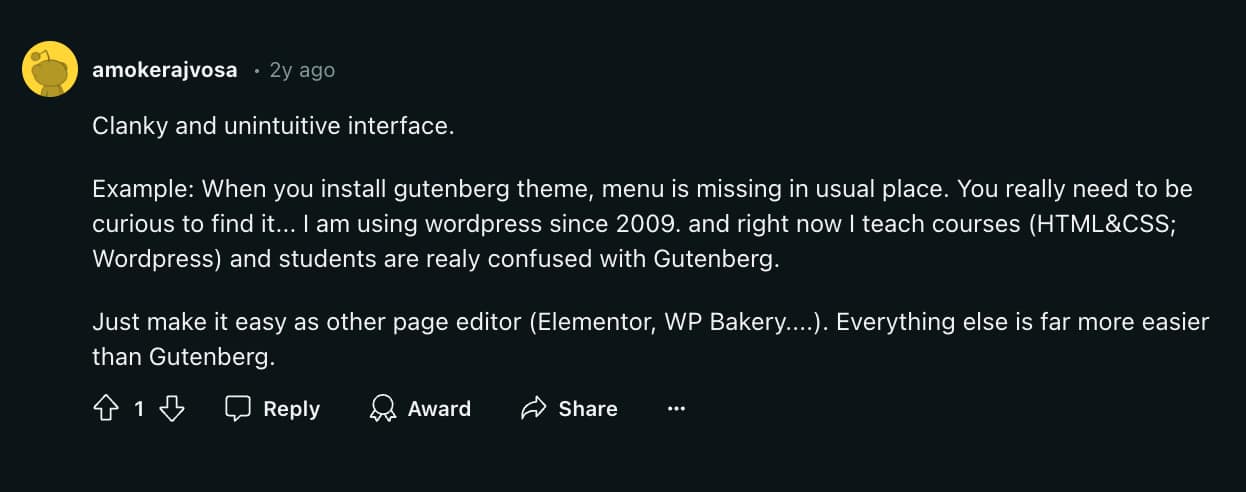

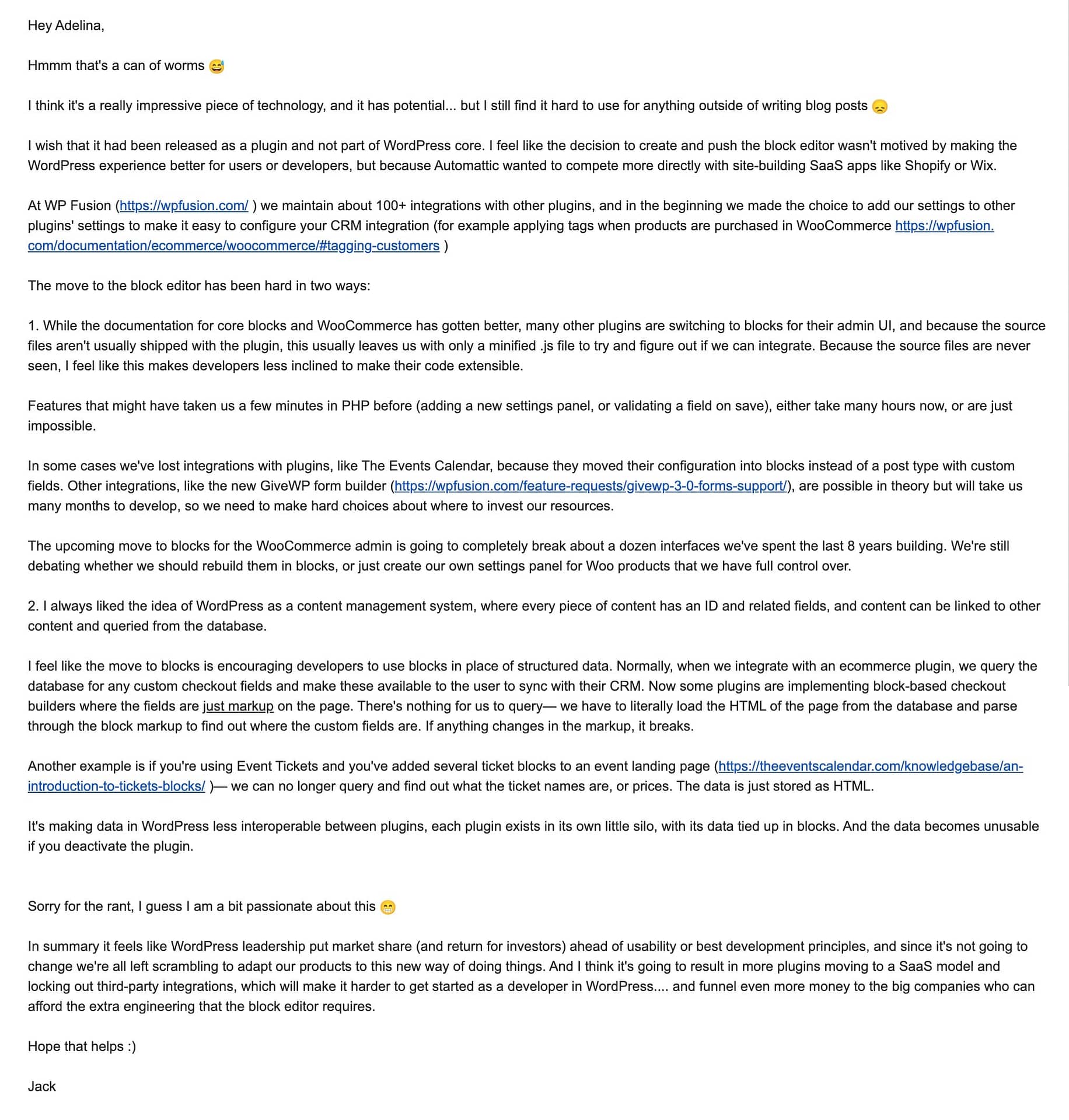

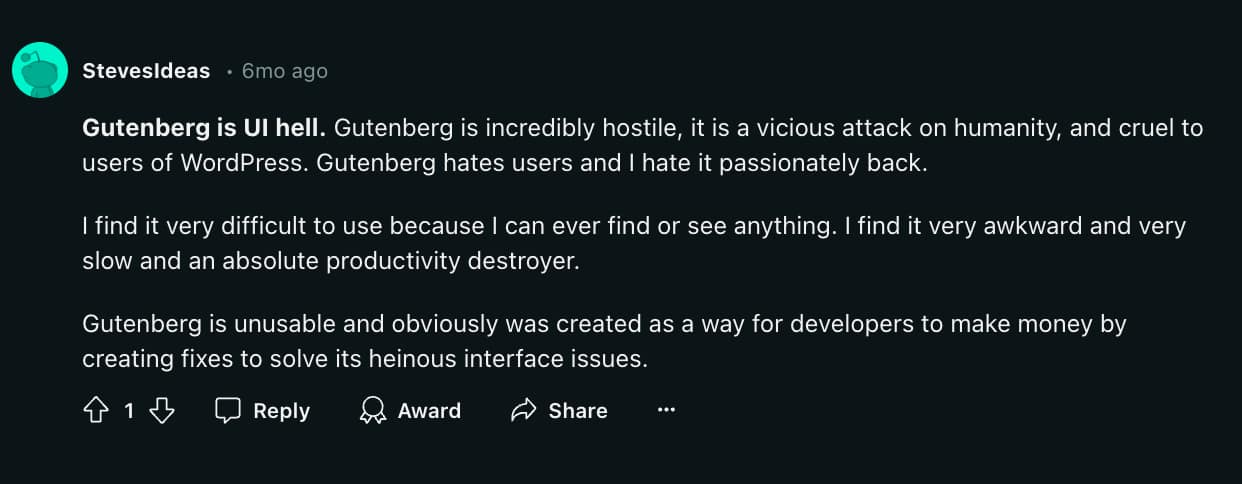



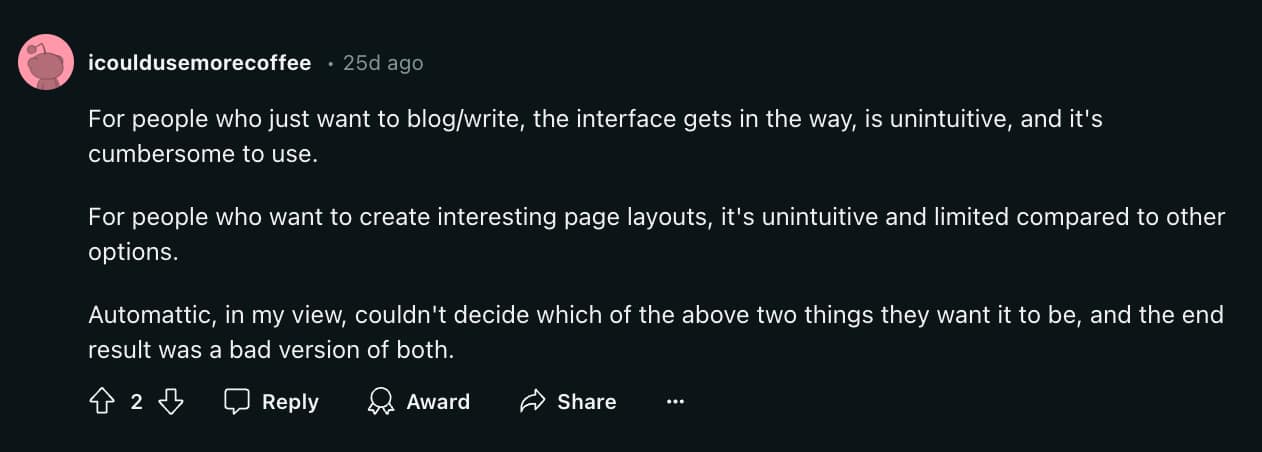

🟢 “Gutenberg offers better unified design and writing tools”
Having all design and writing tools in one place is a big plus for users. Gutenberg’s all-in-one approach saves time and effort, streamlining the content creation and design process – given that you can basically do them both on the same screen. However, this is also pointed by many as a fatal flaw in the block editor’s design, so take it with a grain of salt.
Key points:
- Combines content creation with design elements, making it easier to work on both simultaneously.
- Creators value features that enhance content writing.
- Users enjoy the ability to design layouts and adjust styles directly within the editor.
Example opinions:
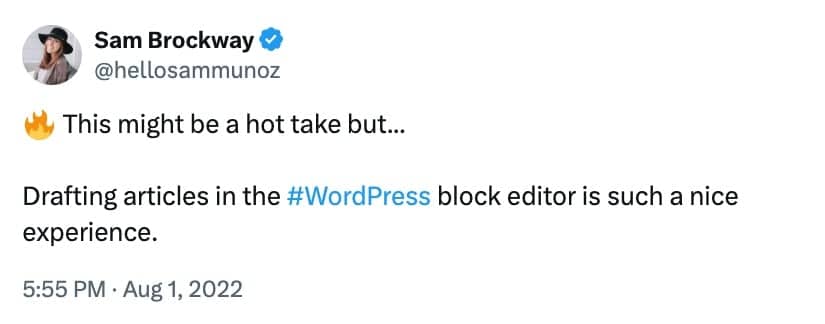



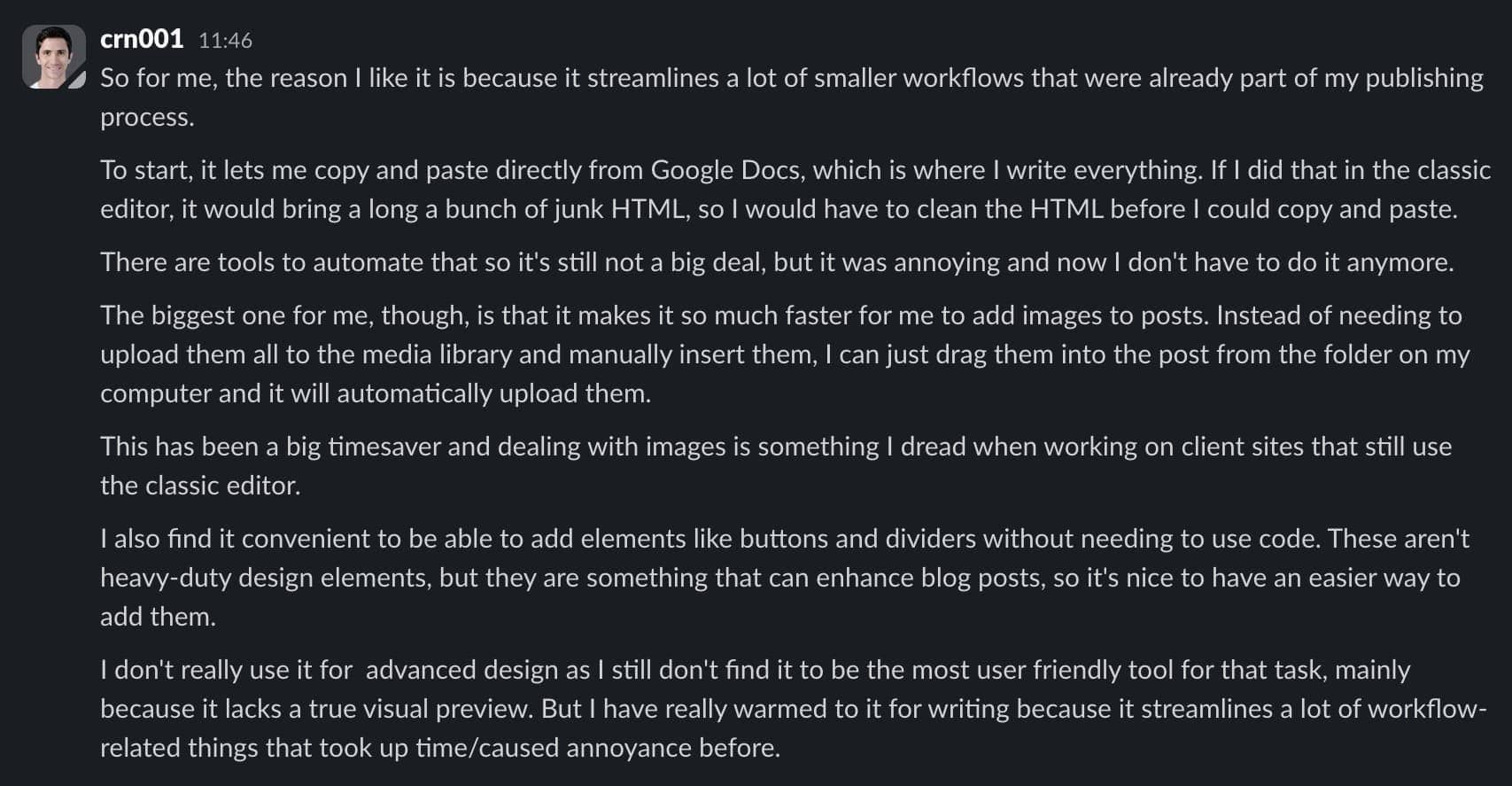



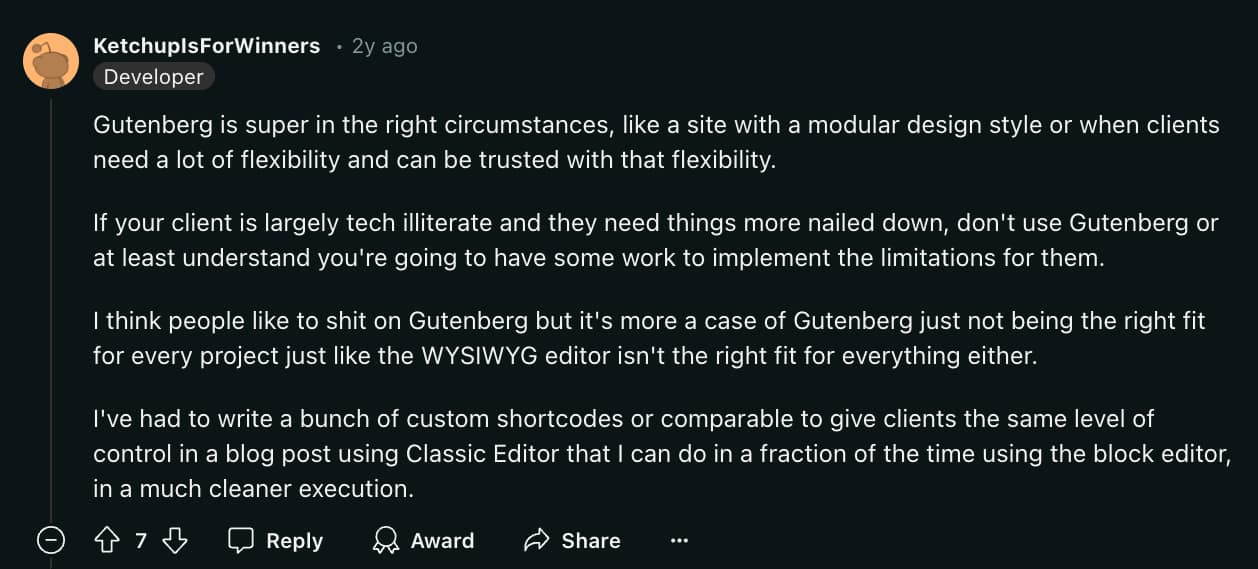

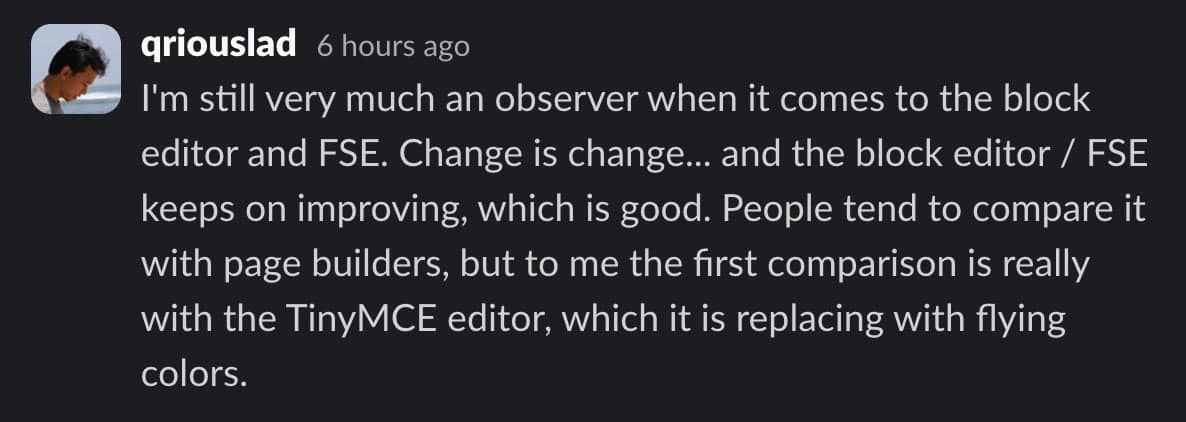





🔴 “Gutenberg is too buggy and unstable”
Mentions of bugs and stability issues are very common, with users experiencing disruptions in their work. These problems can make Gutenberg feel unreliable at times. For example, a noticeable number of users are displeased with occurrences of various icons and UI elements appearing out of nowhere and then vanishing.
Key points:
- Users experience glitches that disrupt their work.
- The editor is perceived as unstable, leading to crashes or unexpected behavior.
- Bugs and instability hinder the ability to work efficiently.
Example opinions:


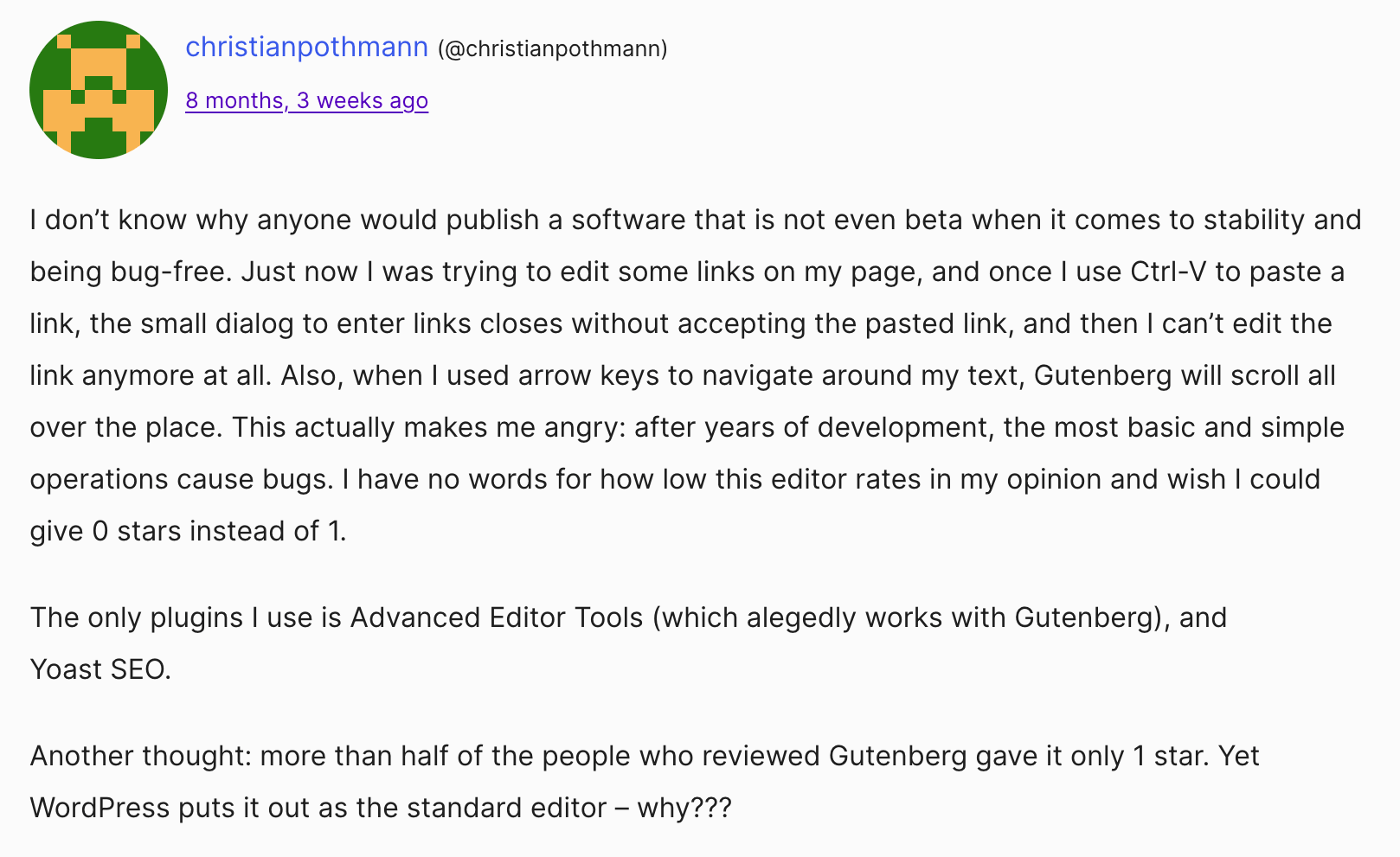



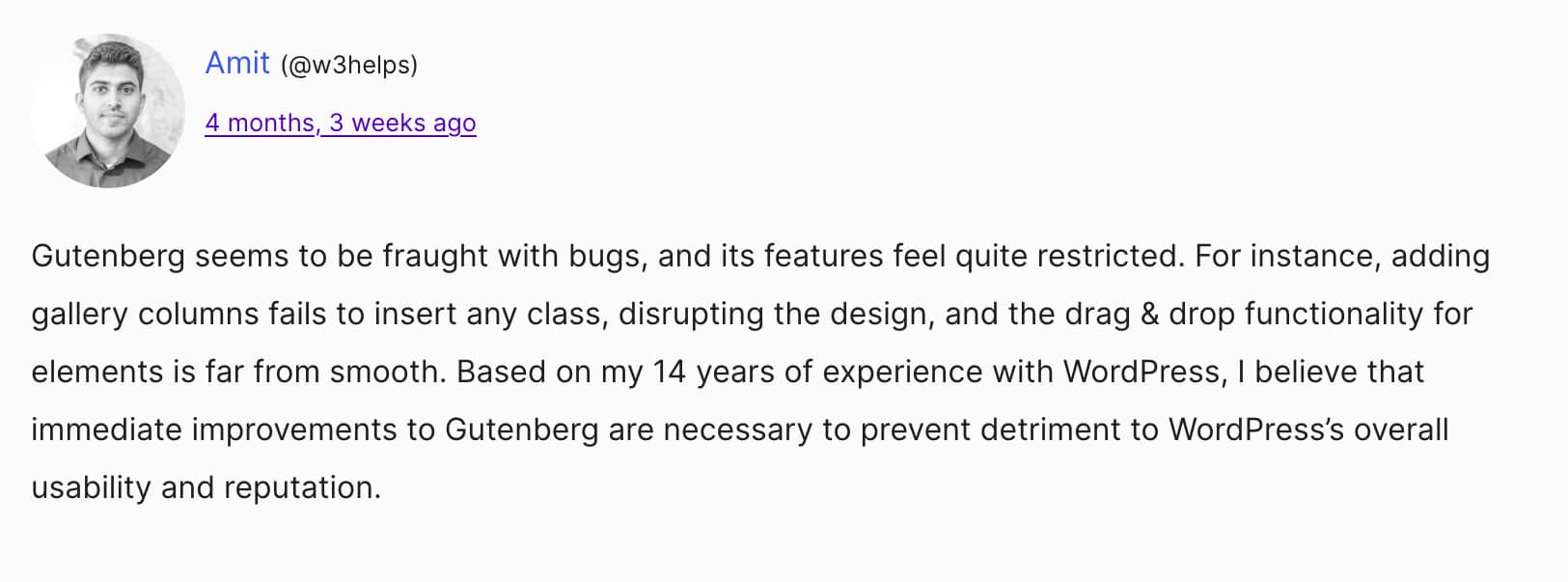

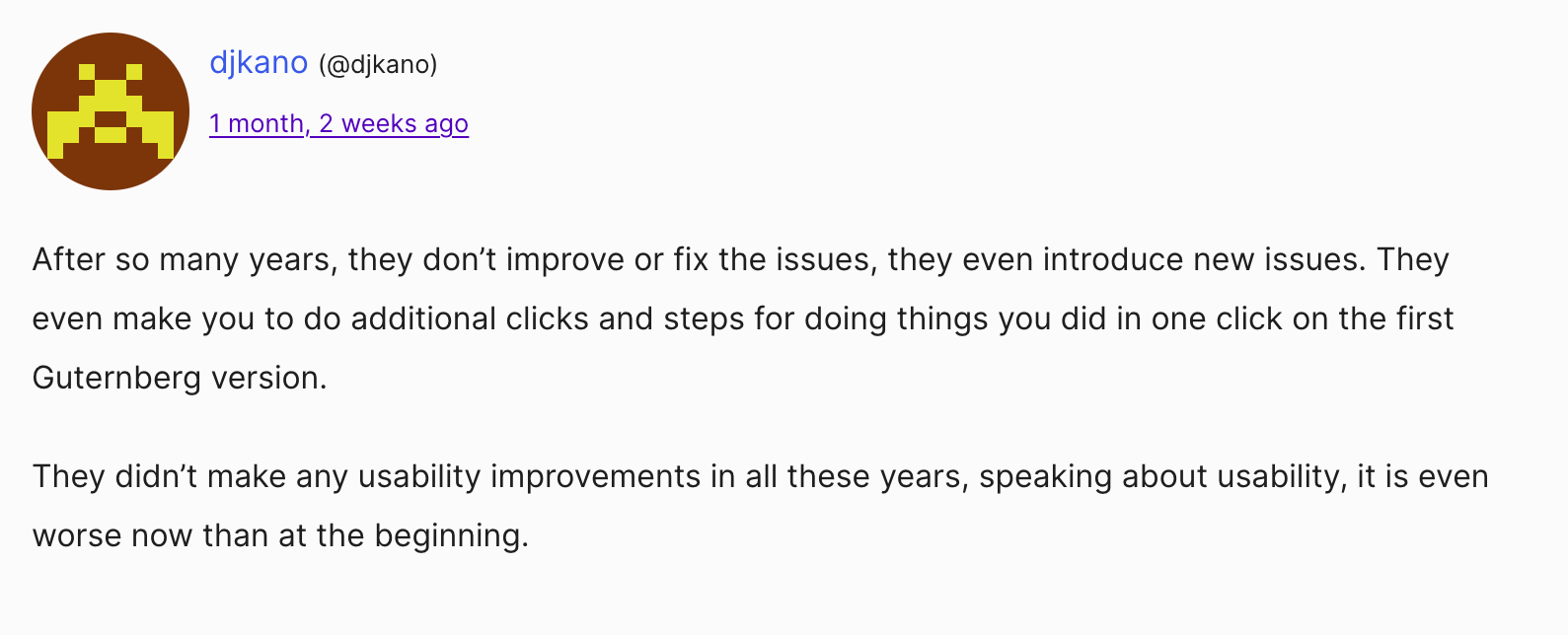

🟡 “Gutenberg is worth giving a chance, but requires patience”
Users expressed mixed general feelings about Gutenberg, recognizing both its potential and its flaws. However, many admitted that, over time, they were able to adapt and now appreciate the block editor’s strengths and features, even if the transition takes some getting used to. Patience is key with Gutenberg, especially for those transitioning from the classic editor.
Key points:
- Users see potential for growth and improvement in the editor. Many aren’t dismissing it outright.
- Users gradually adapt to the editor, becoming more comfortable over time.
- Transitioning from the classic editor or other platforms requires adjustment and patience.
- Once users overcome the initial challenges, they often find the editor beneficial.
Example opinions:
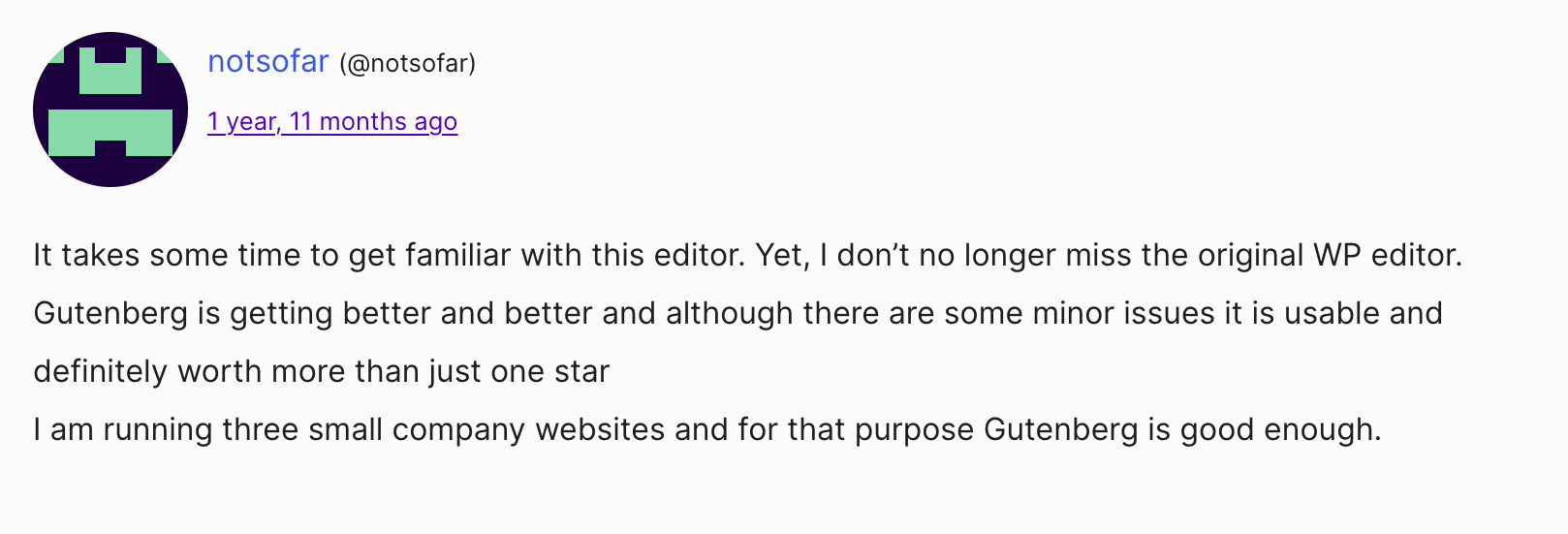







🟡 “Gutenberg is going in the right direction, but not there yet”
Despite the challenges, many users acknowledge that Gutenberg is headed in the right direction. They appreciate the ongoing improvements and remain hopeful about its future, while still noting areas needing attention.
Key points:
- Gutenberg’s improvements haven’t been glossed over by the community.
- There are countless suggestions for continued development to enhance usability.
- There’s a positive sentiment overall about the direction in which Gutenberg is heading.
- Users understand that Gutenberg will remain the future of WordPress.
Example opinions:
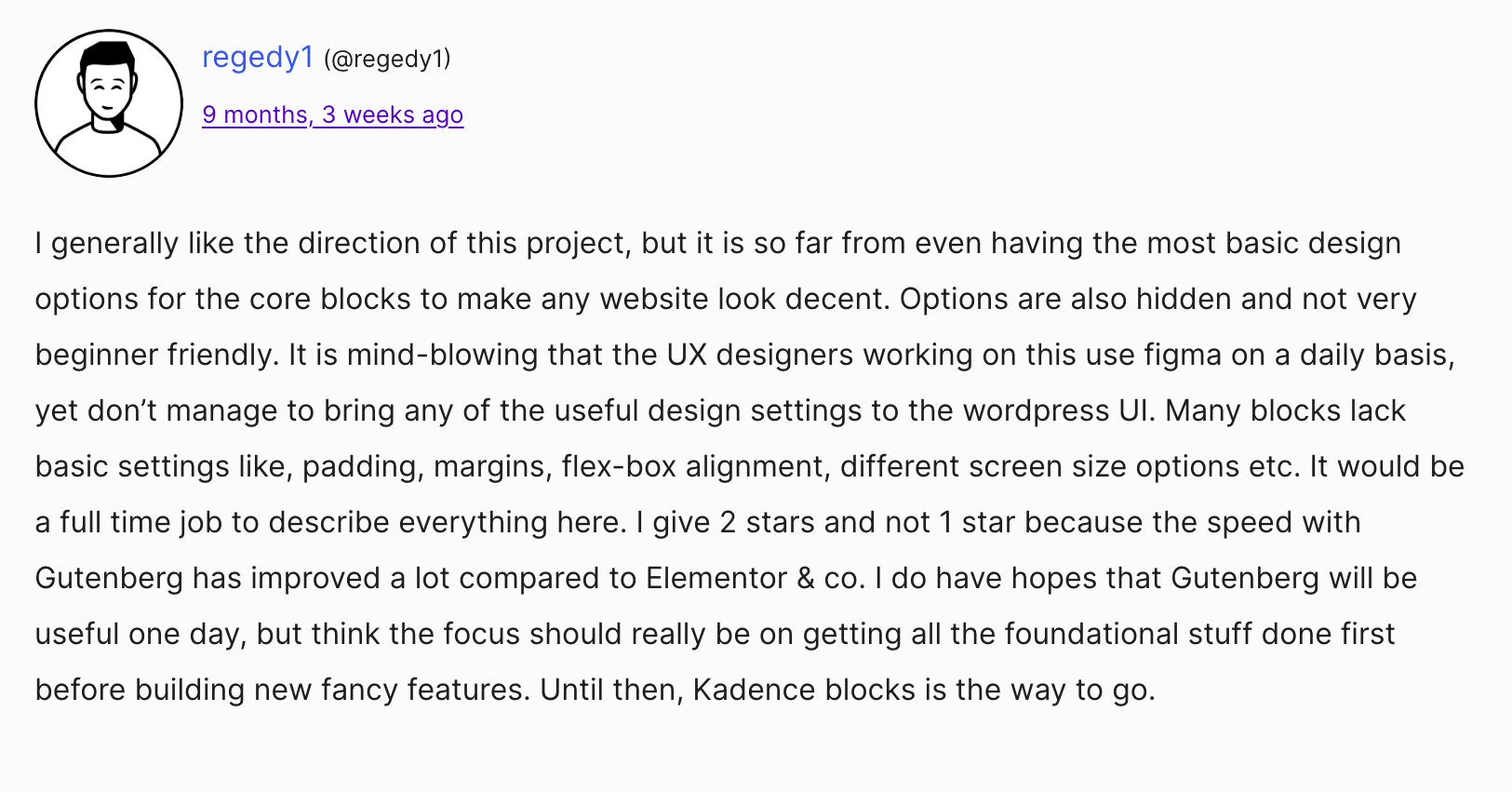





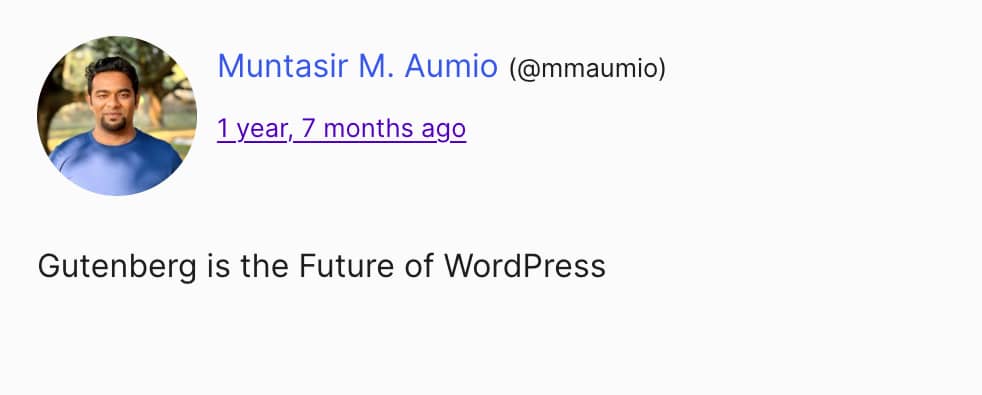





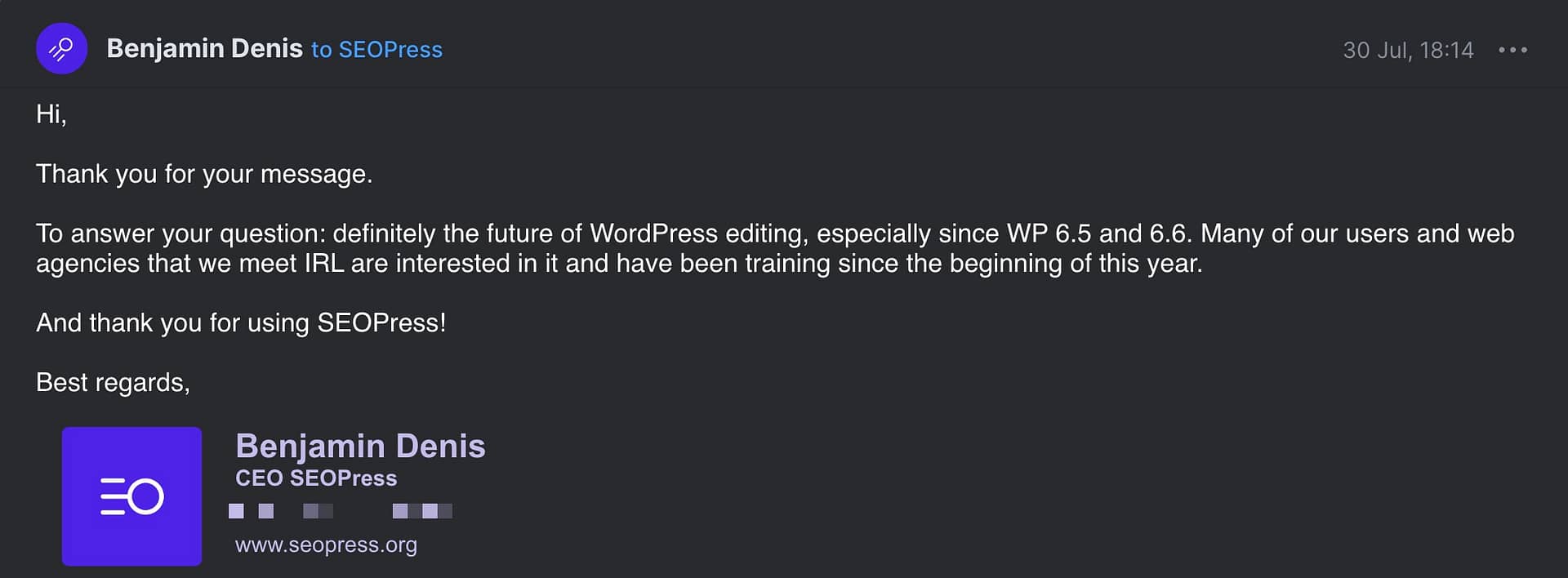

What does all of this mean?
As you can see, the jury is still out on Gutenberg, and that’s a soft way to put it. 🤷
Our favorite block editor has just as many fans as it has people who are not as excited.
One thing that jumped at me when going through these opinions was that people who hate it, really hate it! 🤬 There were multiple comments by people who said they wanted to give it a negative rating, if it was possible.
On the other end of the spectrum, there were noticeably fewer opinions from people who were absolutely in love with the block editor 🥰. But I guess that’s just human psychology – we’re a lot more eager to be vocal abut something we hate.
Okay, but what does all this mean? Are there any takeaways specifically that we Gutenberg developers could learn from?
Key areas for block editor’s improvement
It’s clear there’s still a lot of room for improvement, no one’s denying that. But what seem to be the main pain points for users right now?
Here’s a quick break-down of the key areas where users are hoping to see changes:
Interface simplification is a big one. Many find Gutenberg’s layout complex and unintuitive, especially beginners. There’s a real desire for more straightforward navigation and easier-to-find common tasks. Many users feel like they’re playing hide-and-seek with some features – not ideal when you’re trying to get work done, for sure.
Stability and performance are a huge drawback for many. There are countless opinions voicing frustrations about unexpected bugs disrupting workflows or the editor slowing to a crawl on complex, long pages.
The learning curve is still challenging for many. Better documentation, maybe some in-editor tutorials, and a more user-friendly onboarding experience could go a long way. Imagine having interactive guides right there as you work – this could be a game-changer for new users.
Customization is key. From bloggers to developers, everyone uses WordPress differently. More flexible blocks and advanced options for power users could really take Gutenberg to the next level. While some form of “simplified version” could be a better fit for new users.
Lastly, there’s a strong desire for more streamlined workflows and truly responsive editing across all devices. Even I have to admit, writing a blog post with Gutenberg on a mobile is rather tough.
Is the block editor better than other page builders?
First off, Gutenberg’s been winning a lot of hearts lately. There are multiple opinions from users saying they’ve ditched Elementor and other builders in favor of the built-in editor.
They cite improvements in speed and performance as key factors. This sentiment reflects a growing appreciation for how Gutenberg has evolved. Some users have switched to Gutenberg due to performance issues with other builders. They find it lighter and less resource-intensive, which is crucial for maintaining fast site speeds. And, let’s be frank, who here hasn’t been displeased with some builder’s bloat and resource hoarding?
Ease of use is another factor driving Gutenberg adoption. Users who prefer simpler interfaces often find Gutenberg meets their needs without the added complexity of third-party builders. Sure, this kind of goes against what some other users have said, and only proves that “ease of use” is subjective.
The fact that Gutenberg is integrated into WordPress is also a big plus for many. It eliminates concerns about additional costs (pro licenses of other builders) or compatibility issues that can arise with third-party plugins.
However, it’s not all praise. Lots of users still find Gutenberg lacking in advanced design features compared to other builders.
The choice between Gutenberg and other page builders often depends on specific project needs, including design complexity, user familiarity, and budget considerations. While Gutenberg is gaining ground, users with more complex requirements may still opt for other builders like Elementor or Divi.
Okay, so who actually uses Gutenberg right now?
Who’s loving Gutenberg and who’s not
Let’s see how different types of users are responding to our favorite block editor.
👍 First up, the Gutenberg enthusiasts:
Bloggers and content creators are generally finding their groove with Gutenberg. The block editor’s intuitive approach to adding basic text, images, and media is right up their alley.
New WordPress users are also in for a treat. Without any preconceived notions about how things “should” work, they’re diving right into the block-based approach.
Small business owners are seeing the value too. Gutenberg offers a cost-effective way to build and manage websites without splurging on premium builders, and doing it all on your own (with some time investment, of course).
And let’s not forget the speed demons! Users focused on site performance appreciate Gutenberg’s lightweight nature a lot.
👎 Now, for those facing a bit more of a challenge:
Web developers and designers can find Gutenberg a bit restrictive. They’re used to having more advanced design capabilities at their fingertips, and especially when working with other page builders.
Users transitioning from other editors (classic or page builders) often feel like they’re learning to walk again. The shift to a block-based approach can be jarring if you’re used to a different system.
Lastly, corporate and enterprise users with complex needs might find Gutenberg a bit basic out of the box. They often require more advanced features and customization options.
Conclusions, conclusions…
It was quite fun putting this research together, if I’m honest. No matter what your opinion of the block editor is, one’s for certain, it’s the most polarizing thing about WordPress in the last decade!
There are people who hate it, truly. People who love it. And everyone in between. What makes me hopeful, though, is that even among those who don’t appreciate the editor (yet), there’s noticeable optimism that things are going in the right direction, and that Gutenberg will once grow into the editor that we all need.
As of now, however, in a nutshell, Gutenberg seems to be a hit with those who value simplicity, efficiency, and cost-effectiveness. But for users with more complex needs, or those deeply invested in other systems, there’s still a learning curve to overcome.
What do you think? Add your unique perspective to the 340+ opinions we’ve already gathered in the comments!
Last but not least, a huge shoutout to everyone who took time out of their busy day to share their opinion with me directly:
Yay! 🎉 You made it to the end of the article!
